CHICAGO – In the last several years, how many times have you wanted to shout the “Mad as Hell” movie quote? Well, Invictus Theatre Co. has produced a stage adaptation of “Network” – with that quote shout worthy – at the Windy City Playhouse in Chicago through September 29th. For tickets/details, click HOWARD BEALE.
Film Feature: The Top 10 Underrated Woody Allen Films
CHICAGO – Just as Groucho Marx refused to join any club that would have him as a member, Woody Allen would most likely turn down any invite from an adoring fan club. He’s repeatedly voiced his belief that he doesn’t have a high regard for his own work, and recently told documentarian Robert B. Weide that he could live a life devoid of cinema as long as there was a sports team to follow.
This may sound like a curious statement from a filmmaker who averages one picture a year, but it speaks to the compulsory spirit of a man trapped within the boundaries of his perfectionism. He can’t bear watching his own films once they’re completed because all he sees are the flaws.
As a longtime admirer of Allen’s work, I’ve been able to savor the sublime moments in even his most problematic pictures, and have found that he has made far more good films than bad ones. Last year’s surprise box office hit, “Midnight in Paris,” has inspired some moviegoers to explore Allen’s career for the first time. His best known masterpieces—“Annie Hall,” “Manhattan,” “Hannah and Her Sisters,” “Crimes and Misdemeanors,” “Husbands and Wives”—are cited so often that it may lead some viewers to believe that Allen only made a handful of decent flicks, but that is far from the case. In anticipation of Allen’s latest star-studded ensemble comedy, “To Rome With Love” (which opens in Chicago June 29th), here is my list of the top ten most underrated cinematic treasures written and directed by Woody Allen.
10. “What’s Up Tiger Lily?” (1966)
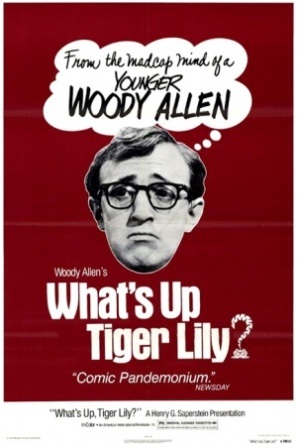
What’s Up Tiger Lily
Decades before the Mystery Science Theater 3000 crew popularized the art of satirical movie commentary, Allen dubbed his own comedic dialogue over footage from Senkichi Taniguchi’s silly 1965 James Bond knockoff, “International Secret Police: Key of Keys.” The resulting film served as Allen’s directorial debut, though it essentially plays like an 80-minute cutaway gag on “Family Guy.” Originally intended as an hour-long television special, “Tiger Lily” was stretched to feature-length without Allen’s consent, and led the director to allegedly disown the project. The expanded version includes wholly unnecessary musical interludes from The Lovin’ Spoonful that prove a little Spoonful goes a long way. Yet the film is still worth a look because the dialogue is chockfull of Allen’s absurdist wit, and his rearrangement of Taniguchi’s footage results in some inspired sight gags. It’s also just plain fun to recall the early period in which Allen (like Mel Brooks) was willing to do anything for a laugh. Allen makes his fetish for Oriental women abundantly clear in a final sequence where the end credits roll next to a Japanese actress performing a striptease. The credits are quickly followed by a disclaimer stating that audiences opting to read the credits rather than watch the woman “need to see a psychiatrist or an eye doctor,” before morphing into a Snellen eye chart. An honorable mention for the number 10 slot would be Allen’s 1994 made-for-TV movie, “Don’t Drink the Water,” featuring 19-year-old Mayim Bialik, who proves to be a natural charmer when stripped of her forced “Big Bang Theory” affectations.
Quotable Allen (QA): “The last time I made love was on the Titanic—unfortunately we never finished.”
9. “Melinda and Melinda” (2004)
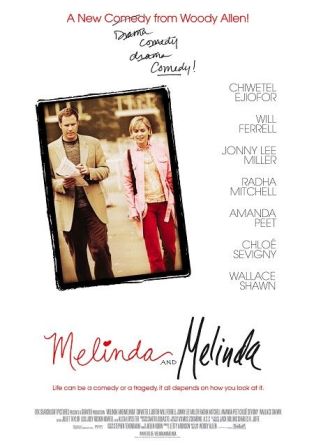
Melinda and Melinda
Is life inherently comic or tragic? That’s a question that perpetually appears to haunt Allen’s subconscious. On the cusp of his success with 2005’s “Match Point,” the director’s creative juices were clearly flowing in “Melinda and Melinda,” which is one of his most cleverly structured films, carrying echoes of the parallel narratives in “Crimes and Misdemeanors.” He utilizes two different approaches to tell the same story about a neurotic woman, Melinda (Radha Mitchell), whose sudden arrival disrupts the lives of a dysfunctional couple. It’s intriguing to observe how certain story elements, such as the rubbing of a lamp, are portrayed as whimsical in one narrative and wistful in the other. The funniest banter in the comic version is delivered by Hobie (Will Ferrell) and his disinterested wife (Amanda Peet), as their marriage falls swiftly on the rocks. Ferrell was criticized for merely aping Allen’s trademark persona, but like Owen Wilson in “Paris,” the actor brings a refreshing energy and zest to the dialogue—Hobie’s gleeful reaction toward his wife’s infidelity is a comic high point. In the dramatic version, Chloë Sevigny is superb as the dutiful caregiver who finds herself attracted to the man that Melinda has embraced as the cure for her diseased mind. In a way, the film involves audiences in the conversation that takes place in Allen’s head as he chooses a tone for a particular narrative. And yet, as Melinda notes, tears of sadness and tears of joy are ultimately the same tears.
QA: “If you’re somebody who’s nobody, it’s no fun to be around anybody who’s everybody.”
8. “Another Woman” (1988)
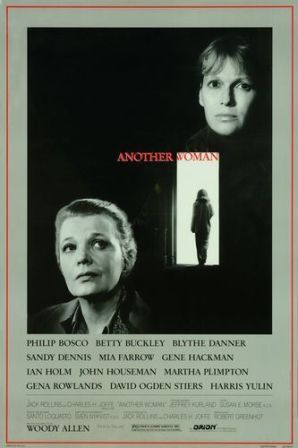
Another Woman
The sterile environments occupied by various Allen characters are carefully designed to protect their inhabitants from the painful messiness of life. Author Marion Post (Gena Rowlands) has been settled in her shell for so long that she’s remained oblivious about the effect she has on others. Everything changes when Marion rents out an apartment and is forced to hear herself think. The voice of her inner emotions is embodied by a tormented woman (Mia Farrow), whose words surrealistically echo from the psychiatrist’s office next door. Like Ludivine Sagnier in “Swimming Pool,” Farrow could be a figment of the author’s wild imagination, a twist that Allen and cinematographer Sven Nykvist suggest throughout with elegant subtlety. This is a quietly affecting drama in the Bergman tradition (several comparisons could be made to “Wild Strawberries”) anchored by a brilliant performance from Rowlands. As Farrow opens up about her fractured relationship, Marion starts awakening to the fact that her marriage to Dr. Post (Ian Holm) might not be as content as she had thought. It’s chilling to hear Farrow’s anguished voice question whether she had made the right choice of husband a few years prior to her own stormy separation from Allen. Holm is as frighteningly android-like as he was in “Alien,” dismissing an ex-wife with the robotic line, “I accept your condemnation.” Frances Conroy, Sandy Dennis and Betty Buckley each deliver caustic cameos that serve as brutal wake-up calls to Marion. Martha Plimpton and Gene Hackman are the film’s charismatic life forces, while John Houseman is achingly tragic in his final role, appearing frail and weighed down with regret (David Ogden Stiers is pitch-perfect as the young Houseman). Allen has assembled formidable ensembles in the past, but few have been used as well.
QA: “One good thing about becoming fifty—you don’t have to do it again.”
7. “Everyone Says I Love You” (1996)
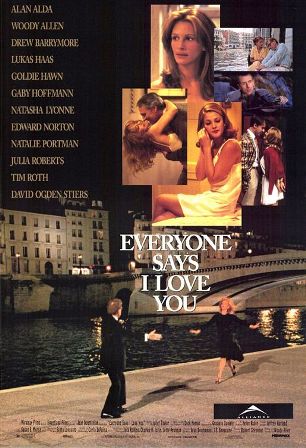
Everyone Says I Love You
Music has played such a crucial role in Allen’s work that it was only a matter of time before he attempted to make a musical. With the invaluable aid of master composer Dick Hyman, Allen selected a series of classic tunes and strung them together with a cheerful narrative without bothering to cast actors who could actually singing. This results in some awkward moments—Drew Barrymore’s voice is clearly dubbed (by Olivia Hayman), while Julia Roberts seems incapable of pronouncing her “L’s”—but the quality of the singing isn’t the point. This is an Allen comedy first and foremost that just happens to involve song and dance numbers. That being said, there are some undeniable showstoppers, such as an exuberant rendition of “Makin’ Whoopee” that takes place in a hospital as the camera swirls around to capture the intricate choreography. Another upbeat number ironically takes place in a funeral home, while Allen and Goldie Hawn (as his ex-wife) share a bittersweet dance that poignantly reflects their relationship. There’s also a great deal to enjoy in the scenes that involve talking, since the script skewers the far left and far right with equally hilarious ingenuity. Hawn believes that prisoners should be permitted to decorate their cells, and appreciates mistreated cons as “social symbols,” but has major issues when her daughter decides to date one of them. Meanwhile, her staunchly conservative son (Lukas Haas) is cured of his Republican ideology when a recently unblocked artery brings sufficient oxygen back to his brain. Not every scene works, but it sure is fun to watch Allen and his cast attempt to pull them off.
QA: “Bring down a copy of my will—and an eraser!”
6. “Radio Days” (1987)
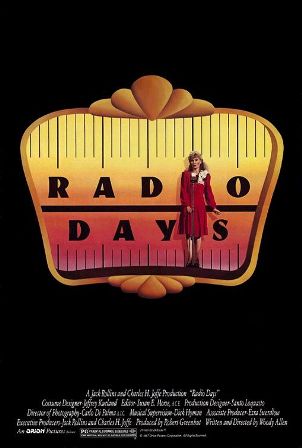
Radio Days
The tendency of one’s mind to romanticize the past has served as the basis for many Allen pictures, extending all the way to “Midnight in Paris.” “Radio Days” is an exhilarating collection of heightened memories spawned from the rainswept nostalgia of an aging man (Woody Allen) who recalls his childhood in New York’s Rockaway Beach, circa 1942. Seth Green plays the young Allen, while Julie Kavner and Michael Tucker are wonderful as his ever-bickering parents. They’re among the multitude of Americans who spend their days eavesdropping on the lives of the rich and famous, who discuss their lavish parties on the radio (it’s interesting to note the ways in which radio filled the roles now occupied by Twitter). As a would-be radio starlet, Mia Farrow’s squeaky, Jean Hagen-inspired voice tends to grate on the nerves, but she still scores some laughs, particularly when she’s abducted by a disgruntled lowlife (Danny Aiello) and his all-too-hospitable mother (Gina DeAngeles). From the spectacular opening number, Harry James’ “Flight of the Bumblebee,” to the final fade out, Allen allows each song to seep into the viewer’s bones. He also finds clever ways of incorporating iconic radio events into the narrative, such as when Orson Welles’ “War of the Worlds” broadcast destroys yet another date for Green’s luckless aunt (Dianne Wiest). In a film overflowing with delightful cameos, Kenneth Mars is a standout as a formidable rabbi who becomes furious when he discovers that Green spent the money that he raised for a new state in Palestine to purchase a Masked Avenger decoder ring. Their altercation leads to a rare instance of child abuse slapstick that actually works. Part “Amarcord,” part “American Graffiti,” this film is an utterly lovely tribute to a bygone era
QA: “I love him, but what did I do to deserve him?”



Nice list, Matt. I would add
Nice list, Matt.
I would add Stardust Memories, what a great film!
My own favorite underrated WA film
Alice (1990) is my absolute favorite Woody Allen film and it seems to be quite underrated and/or unknown. The screenplay is wonderful and Mia Farrow gives one of her very best performances. For anyone who loves The Purple Rose of Cairo or Midnight in Paris, Alice would prove to be a similarly delightful romantic fantasy.